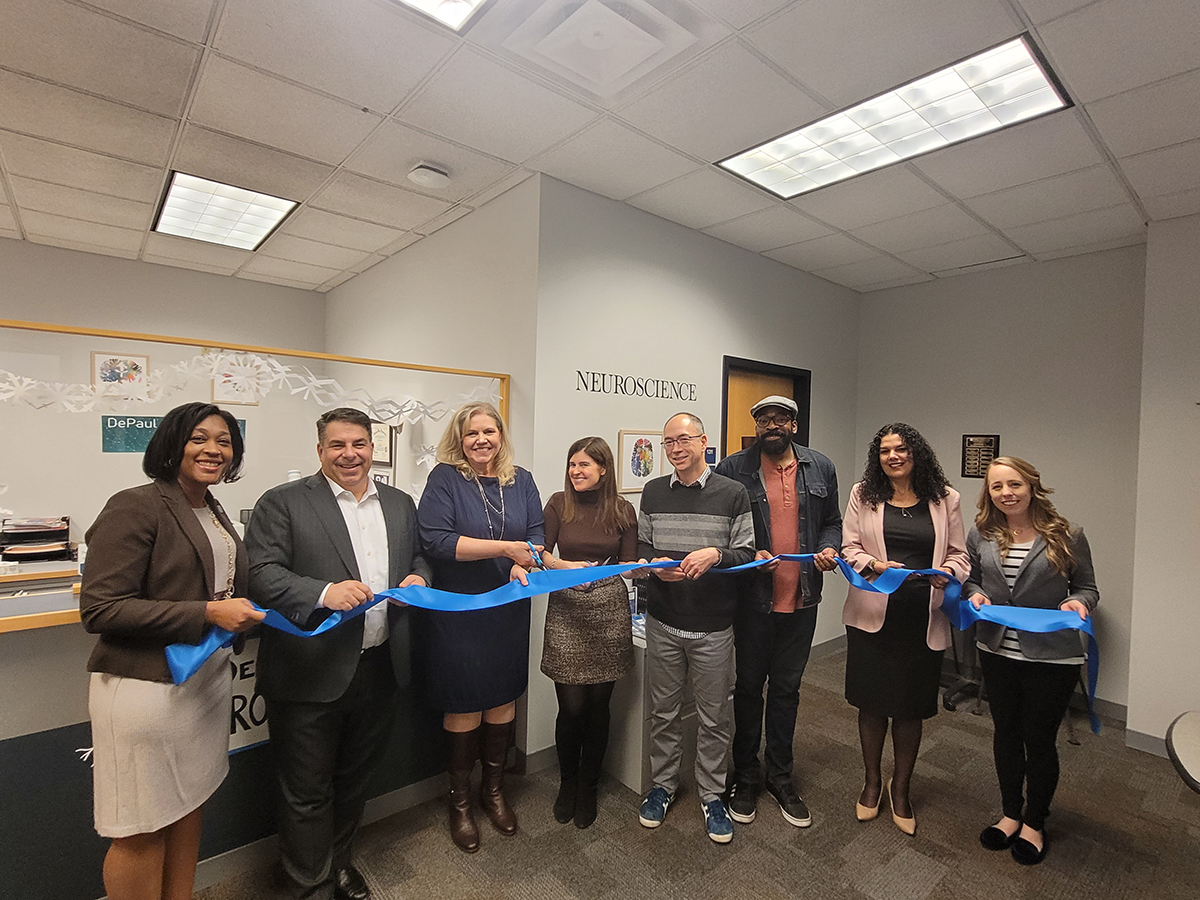 L-R: Stephanie Dance-Barnes, dean of CSH; Robert L. Manuel, university president; Dorothy Kozlowski, department chair and Vincent de Paul professor, Neuroscience; Sandra Virtue, associate department chair, Neuroscience; Eric Norstrom, associate professor, Neuroscience; Okunola Jeyifous, assistant professor, Neuroscience; Salma Ghanem, provost; Jaime Engle, program administrator and success coordinator, Neuroscience (Photo courtesy of Dorothy Kozlowski)
L-R: Stephanie Dance-Barnes, dean of CSH; Robert L. Manuel, university president; Dorothy Kozlowski, department chair and Vincent de Paul professor, Neuroscience; Sandra Virtue, associate department chair, Neuroscience; Eric Norstrom, associate professor, Neuroscience; Okunola Jeyifous, assistant professor, Neuroscience; Salma Ghanem, provost; Jaime Engle, program administrator and success coordinator, Neuroscience (Photo courtesy of Dorothy Kozlowski)
As future brain researchers, health care providers and AI innovators, DePaul students are creating a booming interest in neuroscience. After 15 years of rigorous inquiry into the function of the nervous system, the program begins the 2024-25 academic year as one of the university’s newest departments.
“This is a tremendous accomplishment for all those involved in our program,” says Dorothy Kozlowski, a St. Vincent de Paul Professor and chair of the department. “It is nice to see our team’s effort and dedication reflected with this new designation.”
Beginning as a concentration for biology and psychology majors in 2009, neuroscience became an official program within the College of Science and Health at DePaul in 2016 and has aimed to provide students with an interdisciplinary experience drawing from the natural, behavioral and computational science fields.
“It’s incredible to see the growth and success of the neuroscience program, now elevated to department status. Our faculty’s dedication to providing an interdisciplinary education is truly reflected in the diverse career paths our students are pursuing—whether in health care, artificial intelligence or beyond,” says Stephanie Dance-Barnes, dean for the College of Science and Health. “This program not only equips students with the scientific knowledge they need but also fosters critical thinking and innovation, preparing them for the dynamic challenges of our world. The collaborations across disciplines and the support systems, like Navigating Neuro, ensure our students are well-prepared for both academic and professional success.”
The department currently has four full-time faculty members and one joint appointment, supporting more than 200 students majoring in neuroscience. More than 15 students are studying under the new neuroscience minor, and dozens more from various departments across the university have enrolled in a neuroscience course this fall. Many of these students are interested in health care careers, ranging from nursing to physical therapy. Some are interested in how neuroscience can integrate in other fields such as marketing, law and ethics. A growing number of other Blue Demons, Kozlowski notes, are interested in “big data” and artificial intelligence’s growing integration with the field.
“Artificial intelligence has significantly relied on attempting to mimic what the neural circuits in the human brain can do,” she says. “We have seen the impact of our world’s growing relationship with AI reflected in the interest in our program and what students hope to gain from their studies here. We look forward to continuing to collaborate with the Jarvis College of Computing and Digital Media to enhance our offerings related to computational neuroscience.”
Beyond the Bachelor of Science in Neuroscience, students also can pursue several pre-professional programs including accelerated 3+ programs with Rosalind Franklin University of Medicine and Science in pre-medicine, pre-physical therapy and pre-physician assistant as well as an accelerated program with our recently accredited program in
Occupational Therapy.
In addition to kicking off the school year as a department, the neuroscience team will also begin the second year of Navigating Neuro. Made possible by a Vincentian Endowment Fund grant, the program focuses on student success, connecting new students with faculty, student success coordinator Jaimie Engle and with peer mentors before they step foot on campus. Through community building and resource sharing, Navigating Neuro has helped keep neuroscience majors on track toward graduation.
“We are so grateful for the opportunities the VEF has allowed us,” Kozlowski says. “It’s been wonderful. This year we will focus even more on career readiness and how our students can be more involved on campus.”